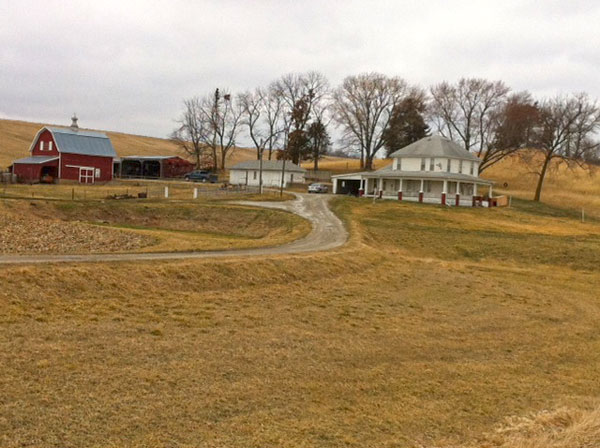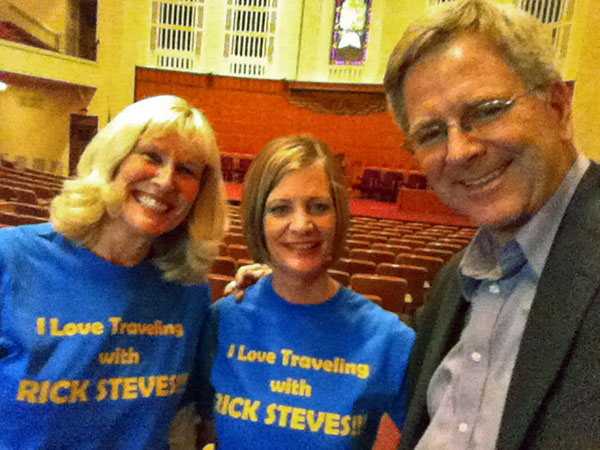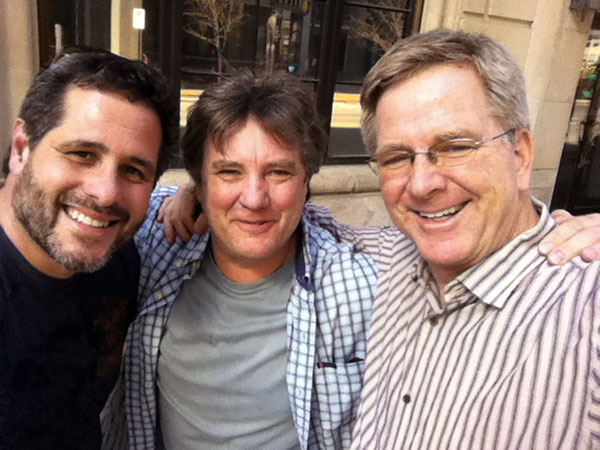
In the last couple of days, our Road Trip USA has taken us from Oklahoma City to Kansas City to Omaha to Des Moines. While there's a majesty about driving across the breadbasket of America, visually, it's all pretty much the same.
Between Kansas City and Omaha, we took the back roads, enjoying Loess Hills National Scenic Byway. The gentle monochromatic farm country -- with golden rolling hills, grandfatherly barns, and tires swinging in the breeze from backyard trees -- is a land of silos and heavy farm machinery. The population is sparse. A good trick-or-treater with a fast bike might hit eight houses if he got an early start.
Sunbeams break through the clouds gliding over the golden fields, sweeping my eyes past power lines and silos to the horizon. Windmills spin a reminder that there's a thriving modern world out there somewhere.
Towns seem fragile. Pondering the wave of destructive twisters that recently ripped through states just east of here, I imagine that a cruel tornado bearing down on these tiny farm communities must think, "Munchies!" American flags break the muted colors, almost daring twisters to blow them down.
I'm charmed by the idyllic old homes in this land where it seems more money has to be spent on heavy machinery than on houses. "Skylines" are silos. And, within a few blocks of Main Street, softly rolling hills blanketed in corn-stubble corduroy stretch in all directions.
March is sleepy time in farm country. Wondering what's in the countless gray silos, it occurs to me how clueless I am about this culture. I later learn that none of the corn we see is the sweet and wonderfully edible corn I've always enjoyed on the cob. It's "field corn," grown for industrial purposes: feed for cows, ethanol, and corn syrup (which, truth be told, is the staple of processed American cuisine).
The economic metabolism of these small farm communities is barely enough to keep a single restaurant in business. In many towns, the only eatery is the local tavern. Page two of small-town newspapers is filled with the police report listing a log of arrests. In this very orderly-feeling world, the majority of arrests are for disorderly conduct.
In Elk Horn, Iowa, I could have enjoyed making a photo essay of the cute and classic rocking-chair porches. But I was hungry, and there was no restaurant open. When I stopped a man (who talked like a young Jimmy Stewart) to ask him for advice, he said, "Just down the street on the left there's Vittles -- oh, this is Tuesday. It's closed. You can get a breakfast pizza at the gas station mini-market." A few miles down the road, near Winterset (John Wayne's birthplace), we found a great little diner.
A big-city person from the coast might wonder about living here. For some humble communities, the best brag they can muster is, "It's a great place to raise a family." But I suspect there's a richness and a focus on what really matters here that those in more sprightly urban areas might not appreciate...or miss altogether. While these communities may feel low-energy, the omnipresent Veterans of Foreign Wars halls, American Legion halls, and cemeteries decorated with as many American flags as flowers remind visitors that the heartland not only feeds America -- but it defends America, too.
While I didn't have time to tour Kansas City and Omaha, my meet-and-greets, TV station appearances, dinners, and evening lectures were delightful. Talking to turn-away crowds at Unity Temple on the Plaza in Kansas City (with the University of Missouri--Kansas City, co-sponsored by the Cockefair Chair and Kansas City Public Television) and Joslyn Art Museum in Omaha (with NET, Nebraska Educational Television), I found myself energized by smart, enthusiastic, and very receptive audiences.
One man affirmed my belief that packing light is freedom by reminding me that the Latin word for "baggage" is impedimenta. Two women drove four hours from St. Louis for my Kansas City talk and wore T-shirts declaring their love for traveling "through the back door" with my guidebooks. And a German-language class, complete with fun posters, filled the first two rows in Omaha.
My favorite moments were meeting little kids with their parents who were regular viewers of my TV show. With 10-year-old star-struck eyes, they couldn't believe they were meeting the character they only knew from their TV sets. The love of their parents -- working so hard to give these kids a broader horizon -- was an inspiration.
Today, Matt flew in to relieve Keith as my driver and partner in this (so far) very smooth road trip. After driving 2,895 miles from Seattle to Omaha, and after 60.5 hours behind the wheel (an average of 6 hours per day for the last ten days), Keith gave the keys to Matt. And we continue on our trans-America, Seattle-to-Florida road trip. Thanks, Keith, for a great drive. Welcome and good luck, Matt! Next stop: Des Moines.
Drivers Matt Yglesias and Keith Stickelmaier with Rick Steves


